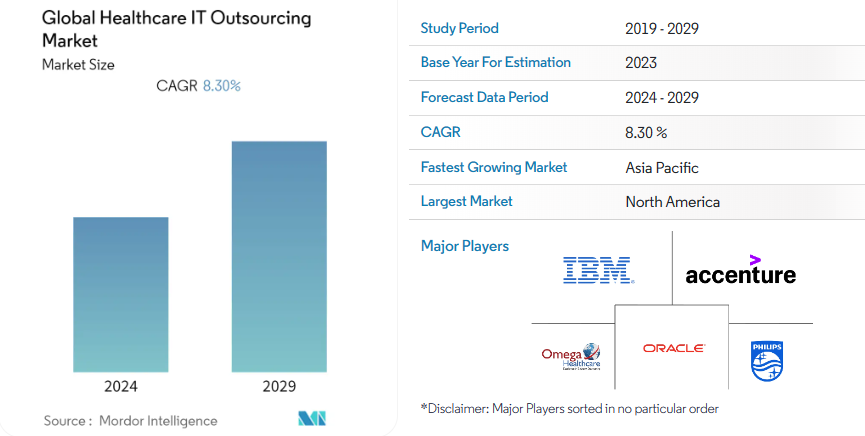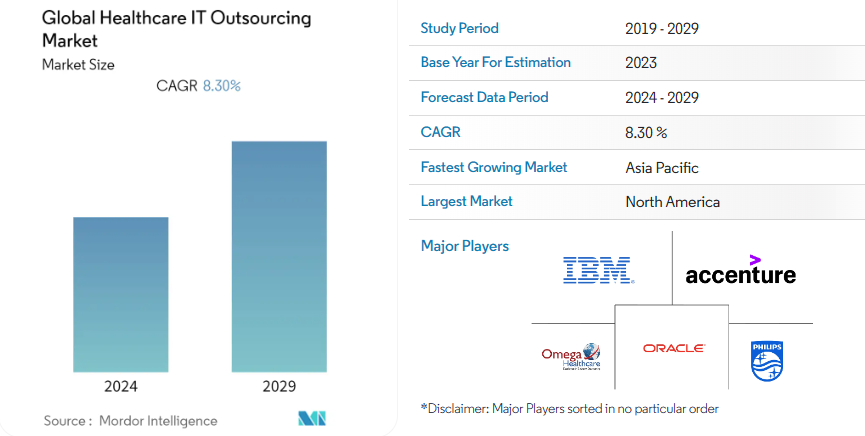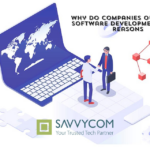What Is Outsourcing in Healthcare? (2024): Comprehensive Review
Outsourcing in healthcare involves the delegation of specific tasks or services to external providers, enabling healthcare organizations to streamline operations and focus on core functions, which has been used by numerous health organizations and facilities. By outsourcing non-core activities, healthcare institutions can enhance efficiency, reduce costs, and improve patient care.
In this article, we’ll delve into the topic of ‘What is outsourcing in healthcare?‘ Our aim is to provide you with valuable information about this essential support, including the types of services, benefits, and categories. Let’s get started!
What Is Digital Healthcare?

The importance of digital healthcare
Digital healthcare combines technology like computers, connections, software development services, and sensors to transform how healthcare is provided. It includes things like electronic health records (EHRs), remote healthcare services, health apps for mobile devices, and wearable gadgets. These advancements make patient care more efficient, enable remote appointments, and help people take charge of their health before problems arise. The growth of digital healthcare shows a move towards personalized, data-based medicine, making treatments more accurate and involving patients more in their care. With its ability to improve results and make healthcare operations smoother, digital health solutions are changing the industry, promising better access, efficiency, and quality care for everyone.
Overview Of Healthcare IT Outsourcing Market
According to Mordor Intelligence, a website specializing in healthcare IT outsourcing market research and analysis, digital healthcare is on the rise. The healthcare IT outsourcing market is expected to grow at a compound annual growth rate (CAGR) of nearly 8.3% during the forecast period (2022-2027). The Covid-19 pandemic led to an increased demand for healthcare IT solutions. These solutions were crucial for maintaining accurate patient information, connecting patient records, and ensuring interoperability and cybersecurity.

Outsourcing healthcare market statistics table
Digital technology is crucial in modern healthcare, revolutionizing patient care and making healthcare organizations more efficient. Some of these technologies include Electronic medical record solution (EHRs), which simplify how data is managed, giving clinicians immediate access to complete patient information. Telemedicine allows remote consultations, making healthcare more accessible and convenient for patients.
Moreover, AI diagnostics help detect diseases accurately and promptly, improving treatment results. Additionally, blockchain technology ensures that patient data exchange is secure, protecting sensitive medical information. These digital innovations transform how healthcare is delivered, leading to better patient outcomes and operational efficiency.
Overview Of Healthcare IT Outsourcing Market
According to Mordor Intelligence, a website specializing in healthcare IT outsourcing market research and analysis, digital healthcare is on the rise. The healthcare IT outsourcing market is expected to grow at a compound annual growth rate (CAGR) of nearly 8.3% during the forecast period (2022-2027). The Covid-19 pandemic led to an increased demand for healthcare IT solutions. These solutions were crucial for maintaining accurate patient information, connecting patient records, and ensuring interoperability and cybersecurity.

Outsourcing market data statistics table in healthcare
For example: A study titled ‘Generation of a Fast Healthcare Interoperability Resources (FHIR)-based Ontology for Federated Feasibility Queries in the Context of COVID-19: Feasibility Study,’ published in the JMIR publication in April 2022, highlighted the significance of standardized data for COVID-19 patients across German hospitals using Fast Healthcare Interoperability Resources (FHIR) profiles. The study demonstrated the feasibility of automatically generating FHIR profiles for COVID-19 patients. As a result, COVID-19 had a significant impact on the growth of the healthcare IT outsourcing market during the pandemic period.
Types Of Healthcare Process Outsourcing
In this section, we’ll explore various types of healthcare IT consulting processes, discussing each type in detail and illustrating how it enhances the overall efficiency of software outsourcing companies in healthcare.
Healthcare coding and financial management

Types of healthcare process outsourcing
Managing healthcare coding and financial aspects poses significant challenges for hospitals and healthcare professionals. Unlike other industries, medical coding and billing involve complex processes that require a deep understanding of universal numeric and alphanumeric codes, such as the Healthcare Common Procedure Coding System (HCPCS), International Classification of Diseases (ICD), and Current Procedural Terminology (CPT). Errors and delays in coding medical services and processing patient bills can occur without skilled personnel, potentially affecting revenue and compliance with regulations.
Outsourcing these functions to third-party coders provides a solution. These professionals have the expertise, tools, and resources to ensure accuracy and efficiency in billing processes. By delegating coding and billing tasks, healthcare providers can prioritize delivering quality patient care and advancing medical research, while also optimizing financial management practices within their clinics.
Claims management and processing
Managing claims is a vital part of healthcare administration, involving complex tasks like handling new insurance policies, gathering information from policyholders, ensuring account accuracy, and submitting claims to clearinghouses. Yet, maintaining error-free claims processing amidst the daily influx of multiple claims can be challenging. Outsourcing emerges as a solution to ensure accuracy and efficiency in this essential medical activity.
Healthcare outsourcing services have the technology and expertise required to swiftly and accurately handle large volumes of insurance claims. By outsourcing claims processing, healthcare organizations can streamline procedures, reduce errors, and speed up payment processing. With claims processing as their main focus, outsourcing firms alleviate concerns about distractions affecting claim accuracy, allowing healthcare professionals to focus on delivering quality patient care and managing other critical aspects of their practice.
Data input services in healthcare
In healthcare, accurate data entry is crucial because of the vast amounts of information generated daily by healthcare providers. From patient insurance details to test and lab reports, prescription and drug inventory, and other medical records, healthcare workers must manage this data meticulously while delivering patient care. Outsourcing data entry services in healthcare not only ensures accuracy but also helps manage the overwhelming volume of information efficiently.
By entrusting this task to specialized providers, healthcare organizations can save valuable time and resources for more critical activities. However, it’s essential to recognize that medical encoding is highly technical and complex, requiring expertise in healthcare processes. Therefore, partnering with a reliable healthcare process outsourcing provider with knowledgeable staff is crucial to ensure accurate and secure data management.
Medical record transcription
Medical transcription is crucial for maintaining detailed patient records. Often, medical professionals find themselves short on time for paperwork, resulting in audio files being stored for later transcription. These transcribed records encompass surgery notes, clinical summaries, and physician findings, serving as valuable references for physicians.
However, the traditional in-house transcription method poses risks of burnout and inaccuracies. Outsourcing medical transcription services to healthcare Business Process Outsourcing (BPO) firms offers significant benefits. It saves costs linked to full-time assistants and ensures timely and accurate transcriptions. Moreover, outsourcing enhances efficiency by allowing medical professionals to focus on patient care rather than administrative tasks.
Receivables management
The last point is that outsourcing receivables management can significantly benefit healthcare providers by enhancing cash flow and reducing the administrative burden associated with chasing payments. Receivables management involves various tasks, such as following up on pending payments, investigating reasons for late payments and claims denials, providing accounts receivable recovery services, identifying deductible amounts, and generating routine reports for patients.
With changes in the healthcare system, managing accounts receivable has become increasingly challenging, prompting many hospitals to opt for healthcare process outsourcing for A/R management. Outsourcing finance and accounting services enables medical companies to maintain a healthy cash flow by preventing unpaid receivables from accumulating, thereby ensuring financial stability.
Looking For a Dedicated Team?
A Dedicated Team might be the best solution in your case. Get in touch with us and we’ll help you choose the best IT outsourcing service based on your business needs and requirements.
What Are The Benefits Of Outsourcing In Healthcare?

Top 5 benefits of outsourcing in healthcare
Outsourcing in healthcare offers significant advantages that streamline operations and enhance patient care. Here’s a breakdown of its key benefits:
- Cost savings and operational efficiencies: By delegating tasks, healthcare organizations trim expenses related to staff hiring, training, and overheads.
- Access to specialized expertise and resources: Partnering with external providers grants access to specialized skills and resources not readily available in-house, which elevates service quality.
- Focus on core competencies and strategic initiatives: Delegating non-core functions allows healthcare entities to concentrate on essential activities like patient care and research, fostering innovation and growth.
- Scalability and flexibility in resource allocation: External partnerships enable healthcare facilities to adjust resources based on demand fluctuations, avoiding the commitments of permanent staff.
- Improved compliance and regulatory adherence: External partners often specialize in regulatory compliance, ensuring healthcare organizations meet industry standards, minimizing the risk of penalties and legal issues.
Overall, IT outsourcing services in healthcare streamlines operations, enhances patient care, and improves organizational performance, making it a strategic choice for modern healthcare management.
Bottom Line: What Is Outsourcing In Healthcare?
Ensuring a positive and lasting patient experience is essential for healthcare companies. Healthcare process outsourcing offers a way to save time and resources while providing excellent patient care. By outsourcing tasks like medical billing, coding, and claims processing, companies can reclaim time and focus on their core strengths.
However, it’s important to remember that medical business process outsourcing requires careful consideration. It’s crucial to evaluate outsourcing vendors thoroughly and choose the one that best fits your needs. If you’re prepared to elevate your healthcare services, outsourcing may be the next step for your business. We hope our article, ‘What Is Outsourcing in Healthcare?’, will clarify things for you. Thank you!
Explore the Power of Digital Healthcare Technologies with Savvycom!
From Tech Consulting to End-to-End Product Development and IT Outsourcing Services, Savvycom has been leading the charge since 2009. Our expertise in Digital Healthcare Technologies has driven business growth across diverse industries. Let us assist you in crafting top-notch software solutions and products, along with a comprehensive suite of professional services tailored to your needs. Partner with Savvycom and unlock the full potential of your healthcare endeavors today!
Savvycom is right where you need. Contact us now for further consultation:
- Phone: +84 24 3202 9222
- Hotline: +84 352 287 866 (VN)
- Email: [email protected]


